Bloom’S Taxonomy Of Educational Objectives Course in Singapore
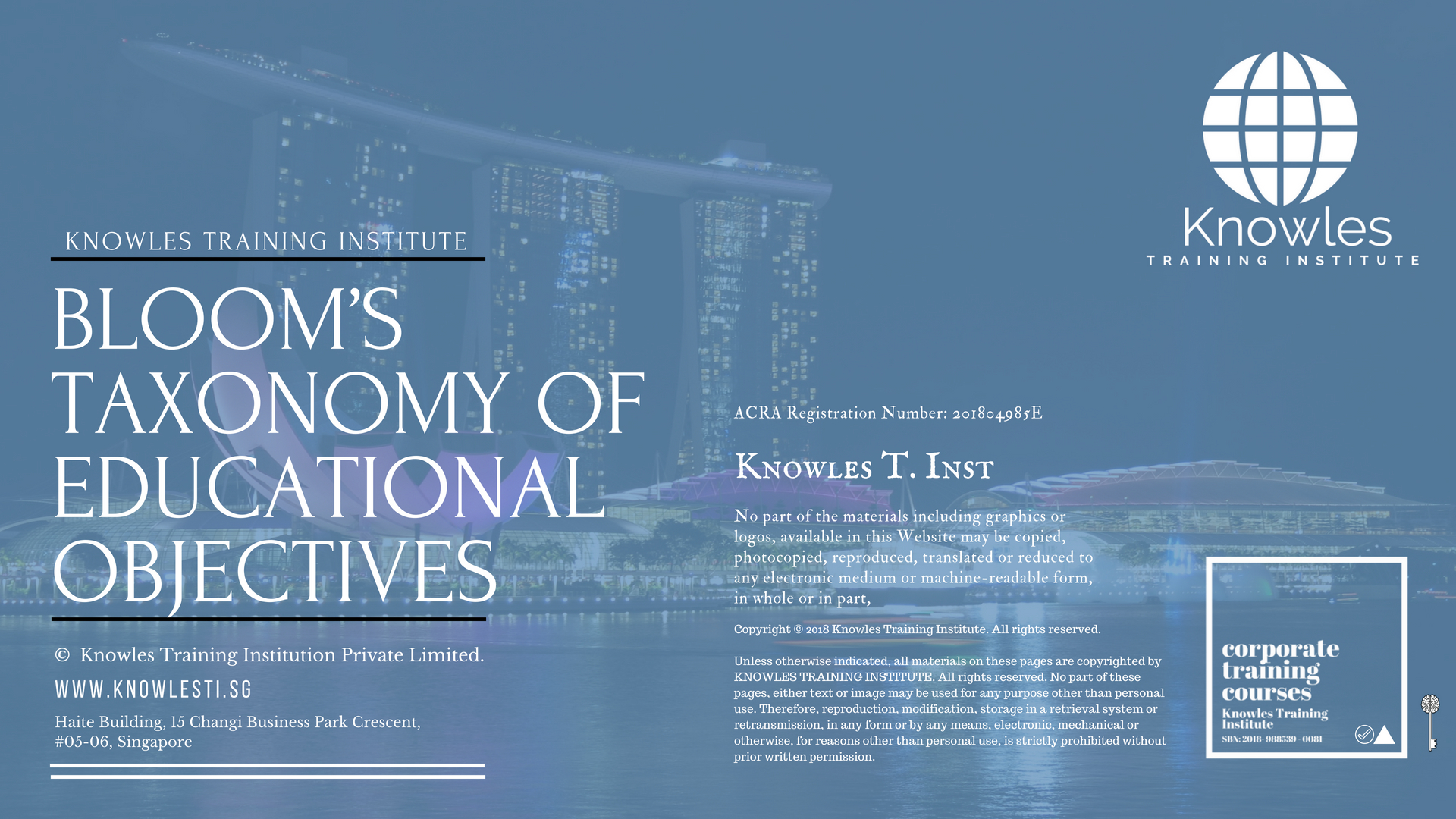
About This Bloom’s Taxonomy Of Educational Objectives Training Course
Bloom’S Taxonomy Of Educational Objectives Course in Singapore
Bloom’s Taxonomy is a method of building learning objectives divided into three hierarchical categories: cognitive, affective, and sensory. This was originally developed by Benjamin Bloom in 1956 and has since then undergone some refinements. The model has levels indicating degrees in expertise and must be completed before advancing to the next.
Who Should Attend This Bloom’s Taxonomy Of Educational Objectives Workshop
This Bloom’S Taxonomy Of Educational Objectives workshop is ideal for anyone who would like to gain a strong grasp and improve their Bloom’S Taxonomy Of Educational Objectives.
All Staff Within An Organisation
Managers
Team Leaders
Executives
Assistants
Officers
Secretaries
Group Size For This Bloom’s Taxonomy Of Educational Objectives Training Program
The ideal group size for this Bloom’S Taxonomy Of Educational Objectives course is:
Minimum: 5 Participants
Maximum: 15 Participants
Course Duration For This Bloom’s Taxonomy Of Educational Objectives Skills Course
The duration of this Bloom’S Taxonomy Of Educational Objectives workshop is 2 full days. Knowles Training Institute will also be able to contextualised this workshop according to different durations; 3 full days, 1 day, half day, 90 minutes and 60 minutes.
2 Full Days
9 a.m to 5 p.m
Bloom’s Taxonomy Of Educational Objectives Course Benefits
Below is the list of course benefits of our Bloom’S Taxonomy Of Educational Objectives course
- Improve students’ ability to understand and apply concepts in learning.
- Increase student achievement and engagement in the classroom and online.
- Enhance students’ ability to effectively demonstrate the concept learnt skills in class.
- Develop effective knowledge assessment tools for individual students and classes.
- Engage students in application of knowledge gained in class and collect feedback from learners.
- Improve students’ capacity to understand simple and complex learning concepts.
- Improve connection between facilitators and students through digitization of Bloom’s domains.
- Develop instructional materials that support the learner through knowledge, cognitive and affective levels.
- Apply Bloom’s taxonomy in teaching and understand students’ strengths and weaknesses which will help improve teaching strategies and activities for learning.
- Enhance effective communication of ideas between facilitator and students
- Incorporate affective and psychomotor domains to elicit students’ response and participation in learning in class.
- Apply Bloom’s domains to improve students’ performance assessment processes.
Bloom’s Taxonomy Of Educational Objectives Course Objectives
Below is the list of course objectives of our Bloom’S Taxonomy Of Educational course
- Understand the meaning of Bloom’s Taxonomy of educational objectives.
- Learn the main characteristics of educational objectives.
- Understand the importance of creating educational objectives.
- Learn in detail the guidelines to developing and evaluating educational objectives through Bloom’s Taxonomy.
- Learn the essential steps of creating Bloom’s Taxonomy of educational objectives.
- Understand the structure and significance of Bloom’s Taxonomy of educational objectives.
- Learn the process of writing effective educational objectives using Bloom’s Taxonomy.
- Understand Bloom’s Taxonomy of educational objectives learning domains.
- Know how to develop learning strategies using Bloom’s Taxonomy educational objectives.
- Appreciate samples of Bloom’s Taxonomy of educational objectives.
- Appreciate definition of knowledge by Bloom’s Taxonomy.
- Learn the process of reviewing the Bloom’s Taxonomy of educational objectives.
- Know the advantages and disadvantages of Bloom’s Taxonomy of educational objectives.
Course Content For This Bloom’s Taxonomy Of Educational Objectives Skills Course
Below is the list of course content of our Bloom’s Taxonomy Of Educational Objectives training course
- Benjamin Bloom created what’s called a “taxonomy” of learning, breaking learning objectives down into three ‘domains’ cognitive(knowledge), psychomotor(skills), and affective(attitudes).
- What are main characteristics of educational objectives?
- What is the importance of creating educational objectives?
- What are the guidelines to developing and evaluating educational objectives through Bloom’s Taxonomy?
- What are the essential steps of creating Bloom’s Taxonomy of educational objectives?
- What are the benefits of Bloom’s Taxonomy of educational objectives?
- What is the process of writing effective educational objectives using Bloom’s Taxonomy?
- What are the learning domains and sub-divisions of Bloom’s Taxonomy of educational objectives? Cognitive (knowledge): The cognitive domain refers to processing and reproducing information that’s been learned. It entails the following six levels of thinking that range from simple to complex: remember, understand, apply, analyze, evaluate, and create. The cognitive domain is particularly relevant to education. Affective (valuing): The affective domain relates to our attitudes, feelings, and ethics in response to things and situations. It includes five learning levels: receiving, responding, valuing, organization, and characterization. Psychomotor (physical/doing): The psychomotor domain emphasizes use of coordinated motor skills to physically control objects. Levels at this domain are imitation, manipulation, precision, articulation, and naturalization, which range from imitating to performing instinctively.
- How do instructors develop learning strategies using Bloom’s Taxonomy educational objectives?
- What are some examples of educational objectives by Bloom’s Taxonomy?
- How does Bloom’s Taxonomy define knowledge? Examine the levels of knowledge by Bloom’s Taxonomy educational objectives?
- What is the process of reviewing the Bloom’s Taxonomy of educational objectives?
- What are the assessment tools based on Bloom’s Taxonomy of educational objectives?
- How do instructors use Bloom’s Taxonomy of educational objectives in classroom assessment?
- What are the advantages and disadvantages of Bloom’s Taxonomy of educational objectives?
Bloom’s Taxonomy Of Educational Objectives Value Added Materials
Each participant will receive the following materials for the Bloom’S Taxonomy Of Educational Objectives course
Bloom’S Taxonomy Of Educational Objectives Learner’s Guide
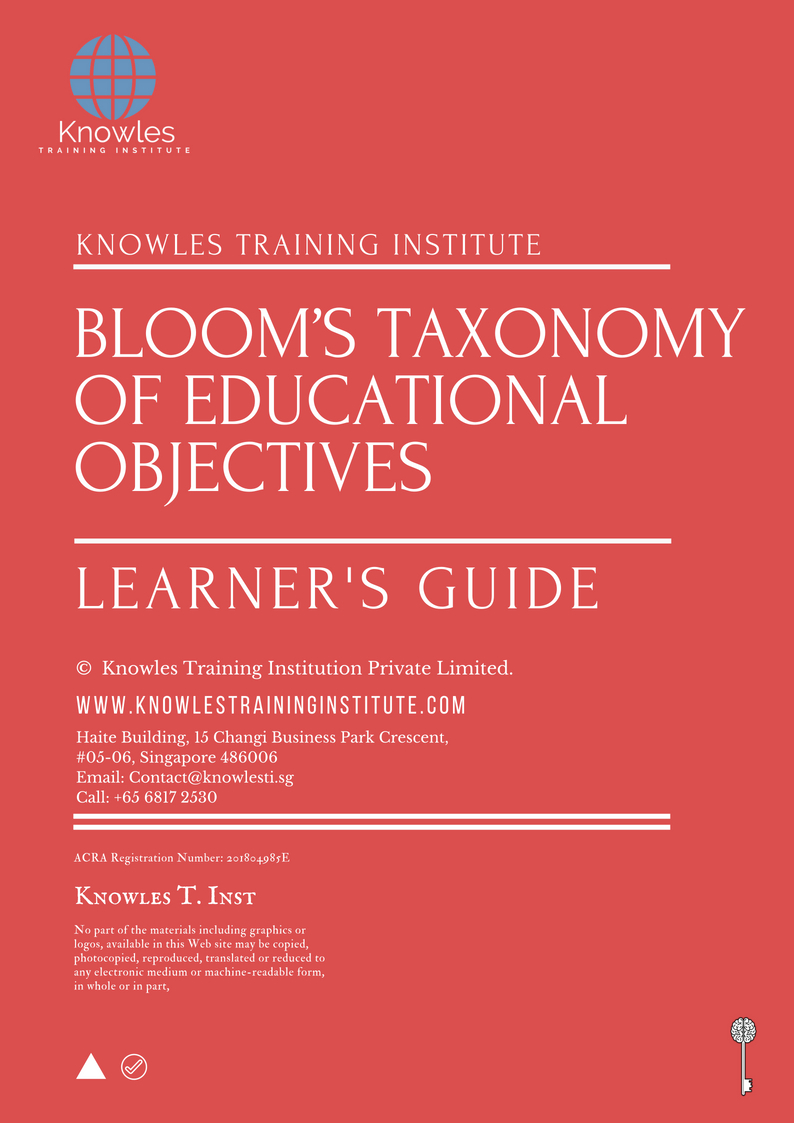
Bloom’S Taxonomy Of Educational Objectives Key Takeaways Notes
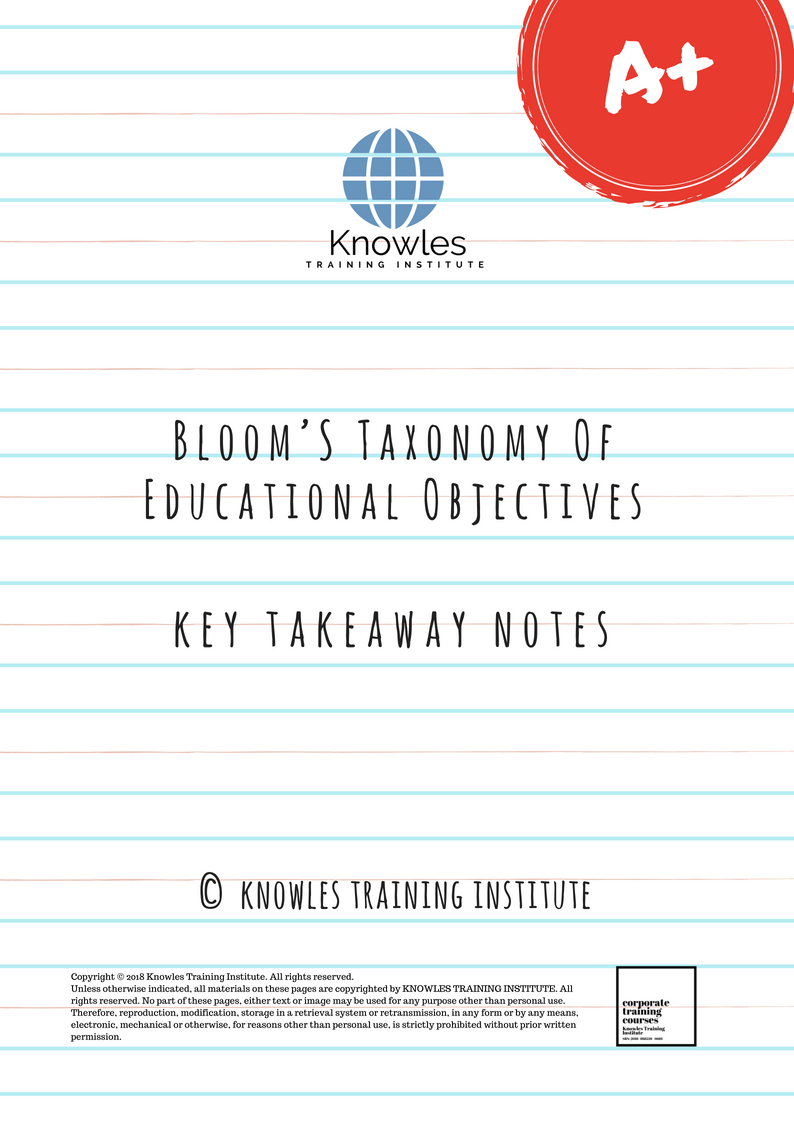
Bloom’S Taxonomy Of Educational Objectives Essentials Ebook
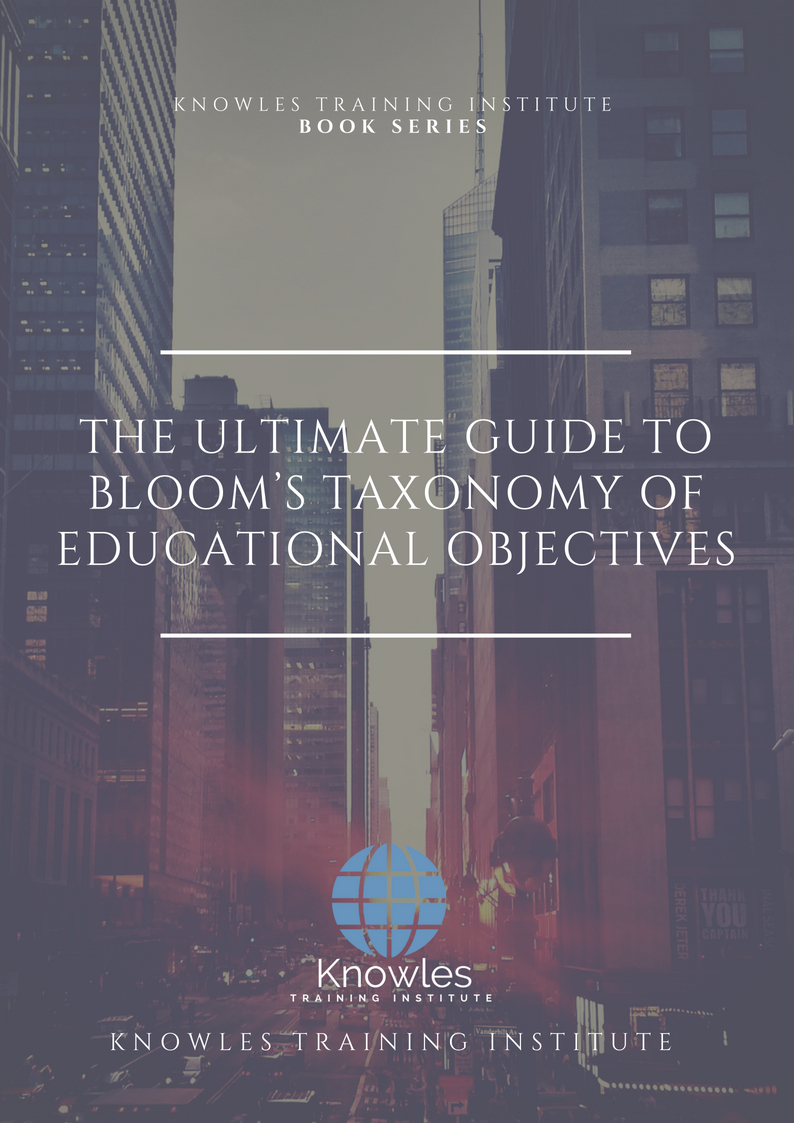
Bloom’S Taxonomy Of Educational Objectives Course Handouts
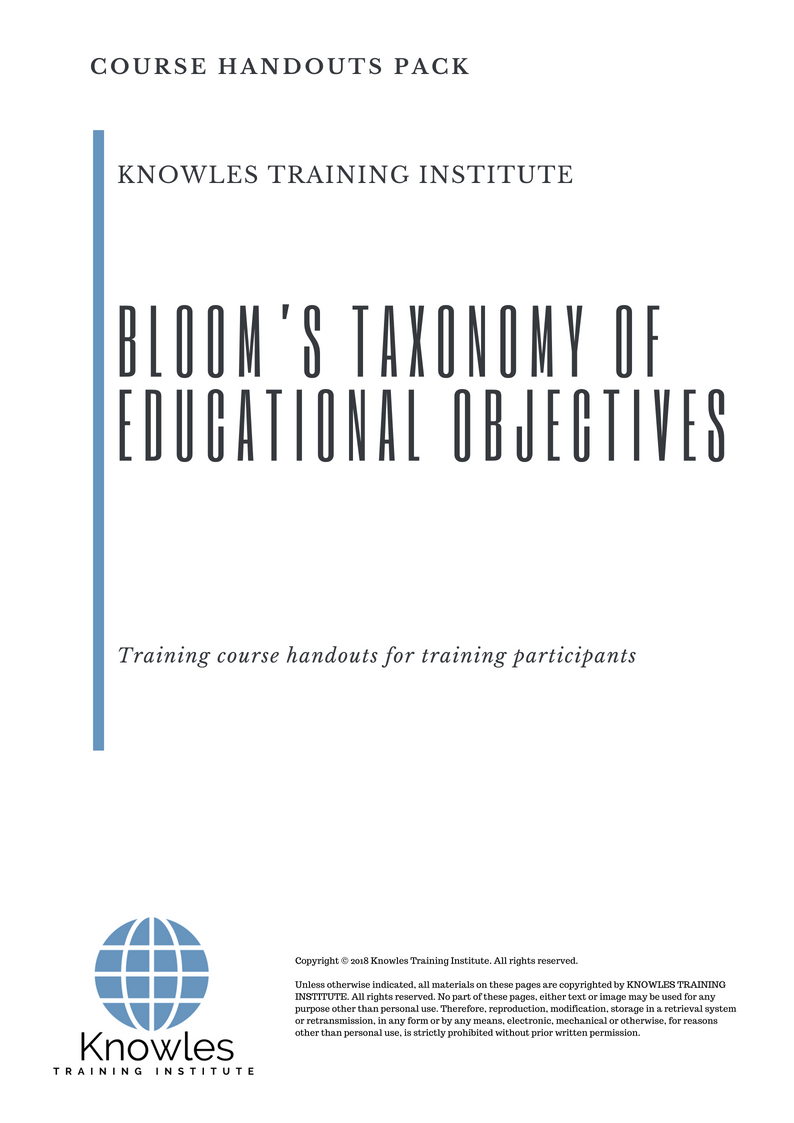
Bloom’S Taxonomy Of Educational Objectives 30-Day Action Plan
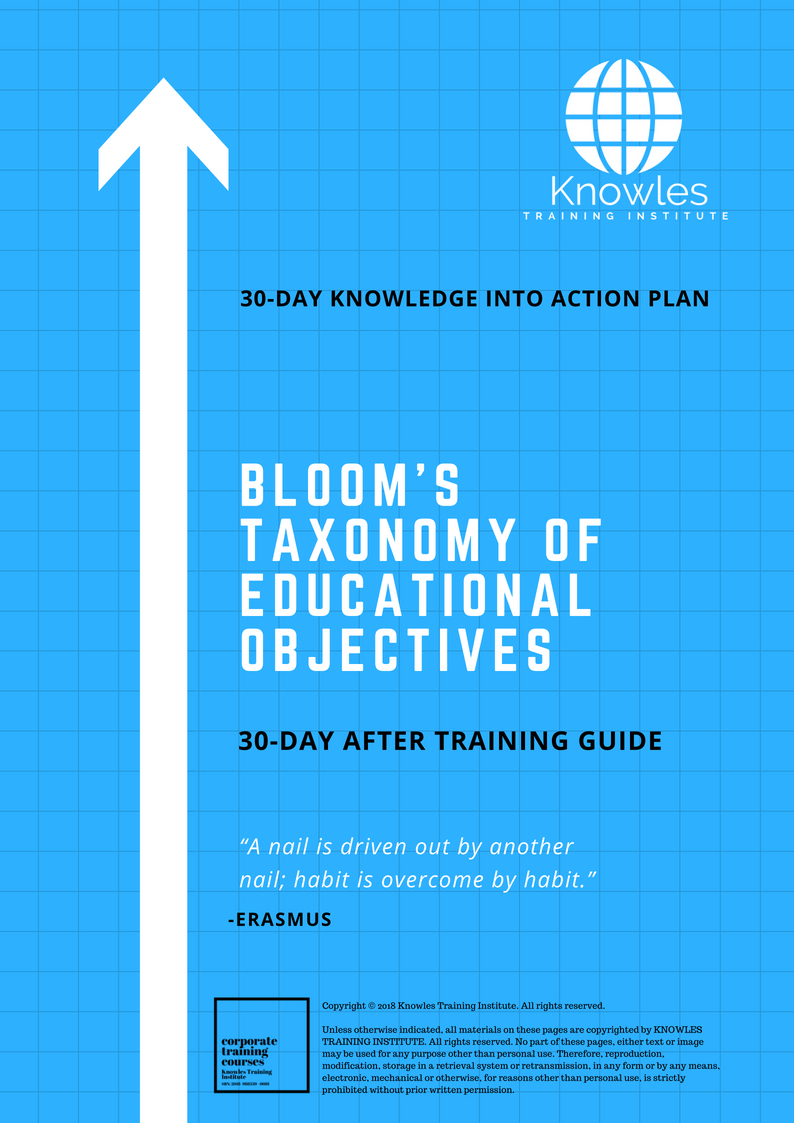
Bloom’S Taxonomy Of Educational Objectives MindMaps Pack
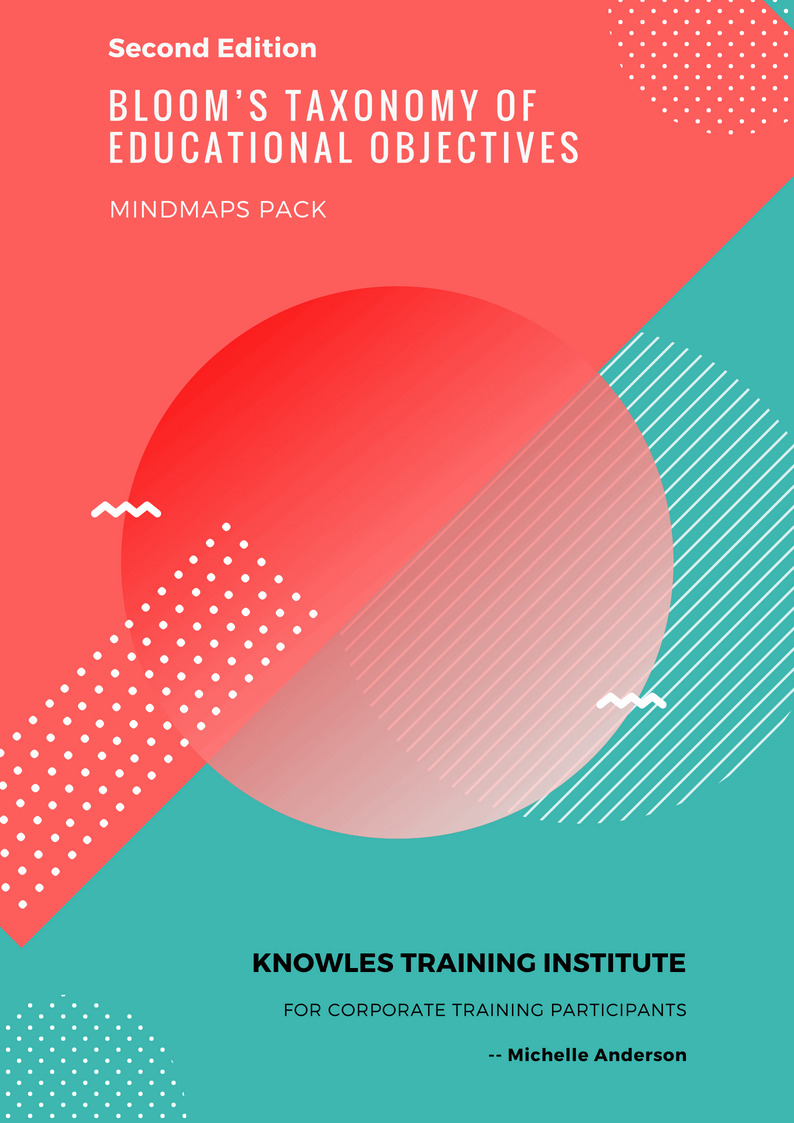
Bloom’S Taxonomy Of Educational Objectives PPT Slides Used During Course
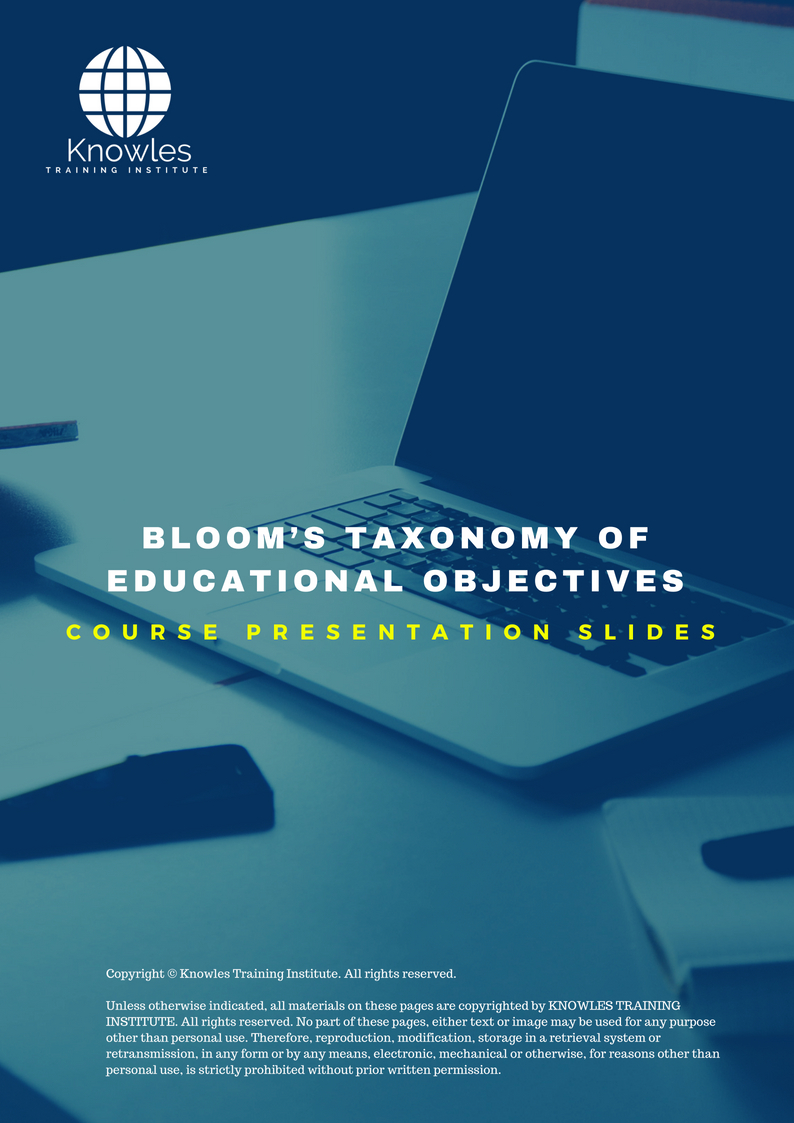
Bloom’S Taxonomy Of Educational Objectives Long-Term Memory Flashcards Pack
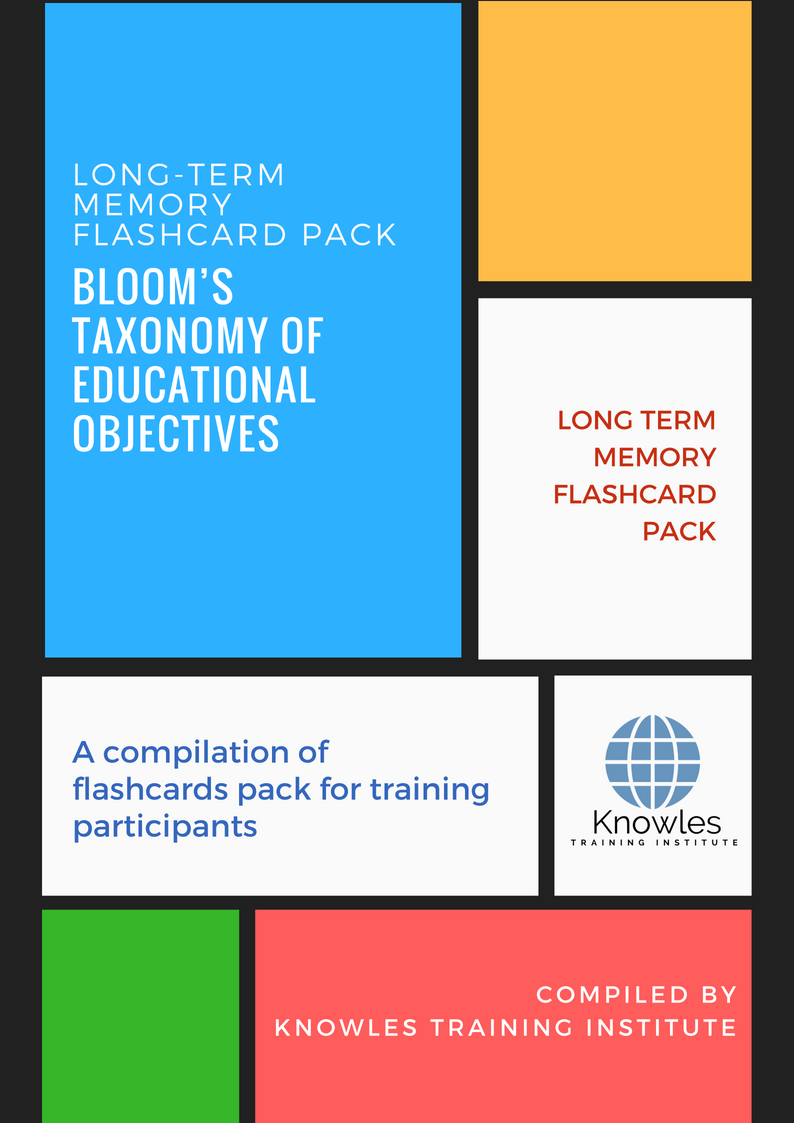
Bloom’S Taxonomy Of Educational Objectives E-Learning Course
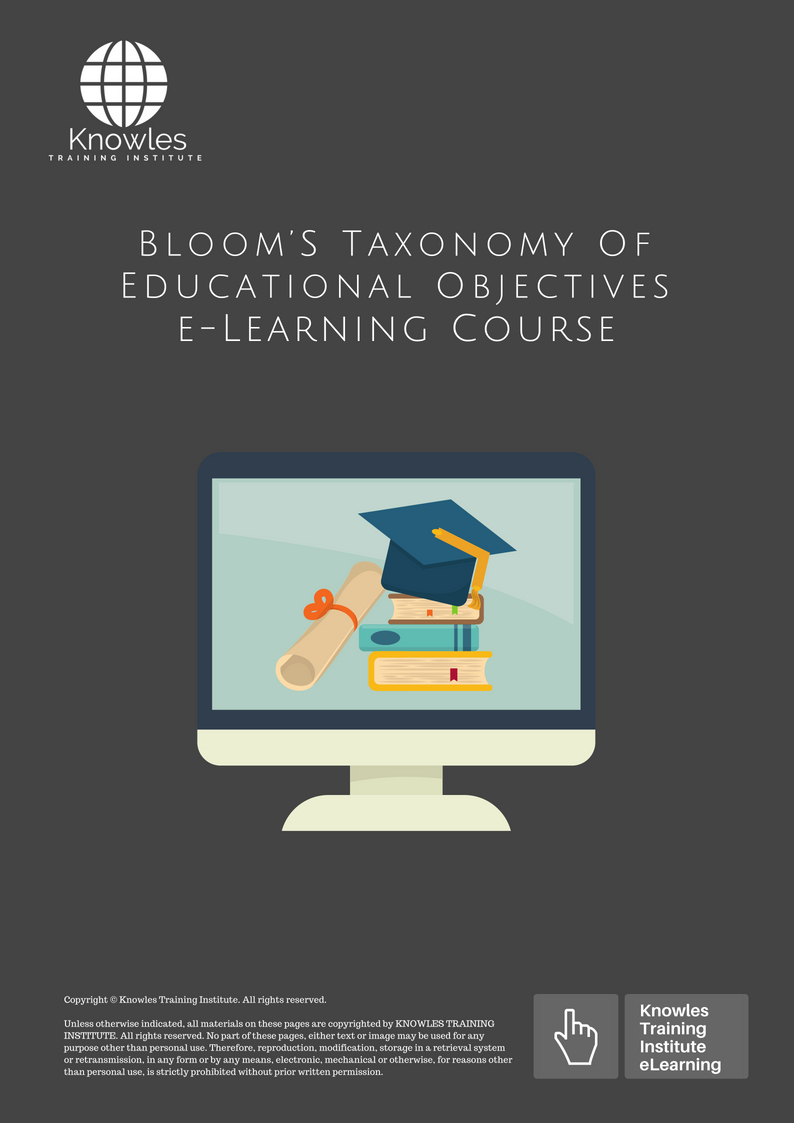
Bloom’S Taxonomy Of Educational Objectives Online Video Course
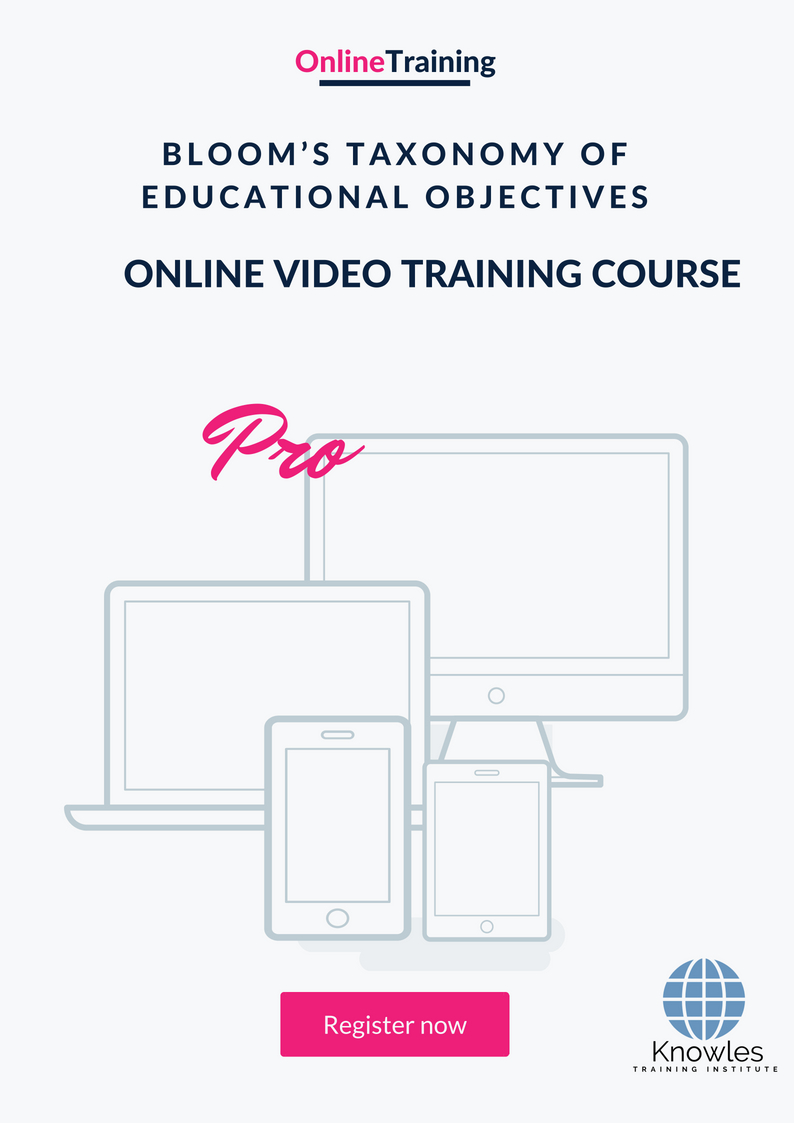
Bloom’S Taxonomy Of Educational Objectives Essentials Audiobook
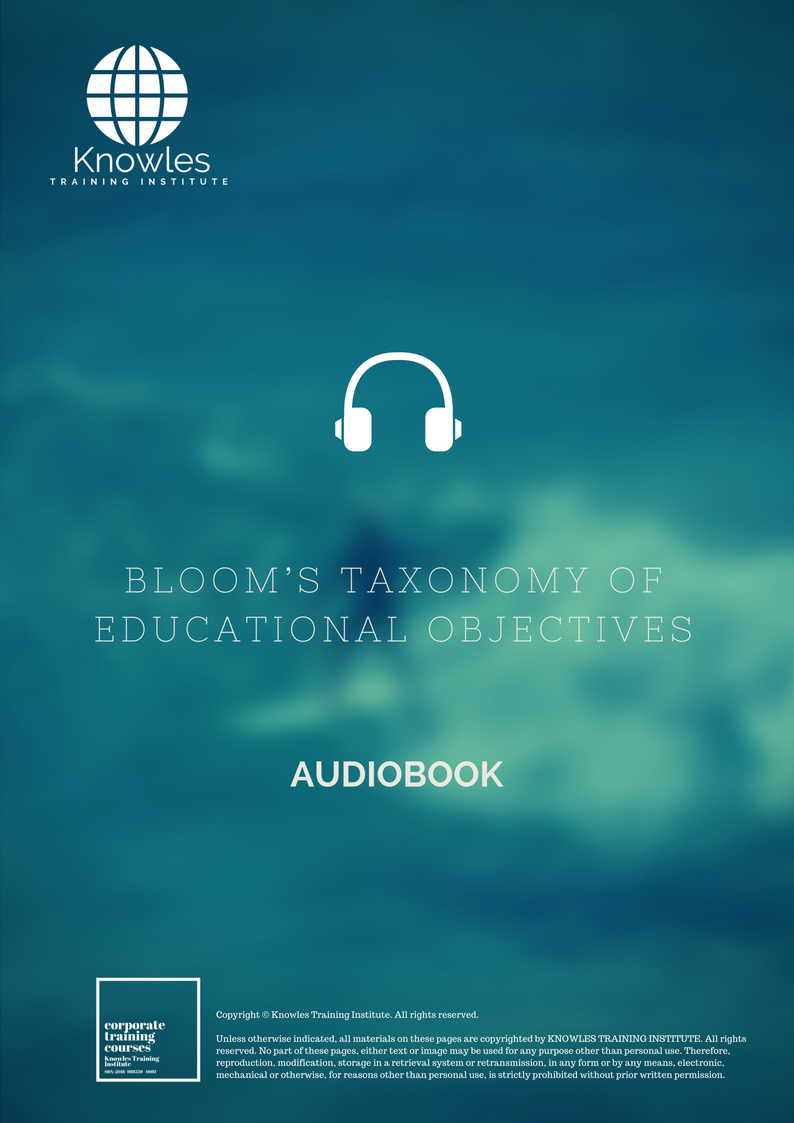
Bloom’S Taxonomy Of Educational Objectives Infographics Pack
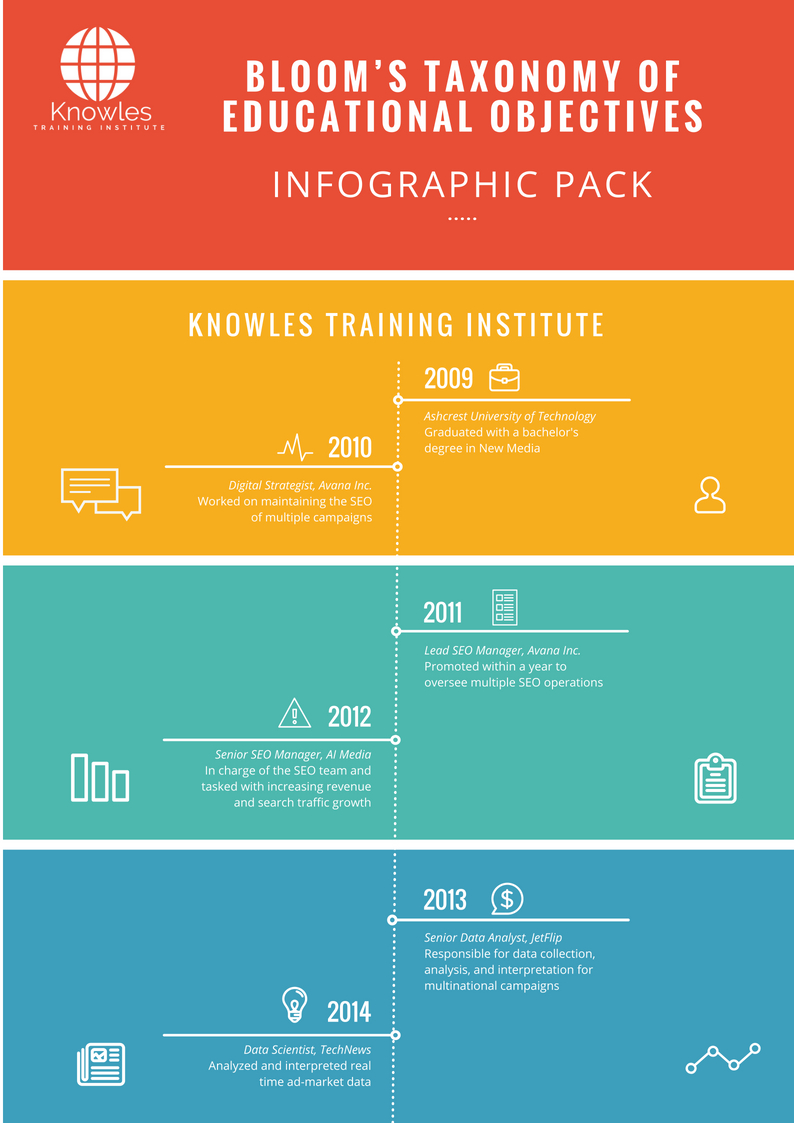
Bloom’s Taxonomy Of Educational Objectives Certification
Each course participant will receive a certification of training completion
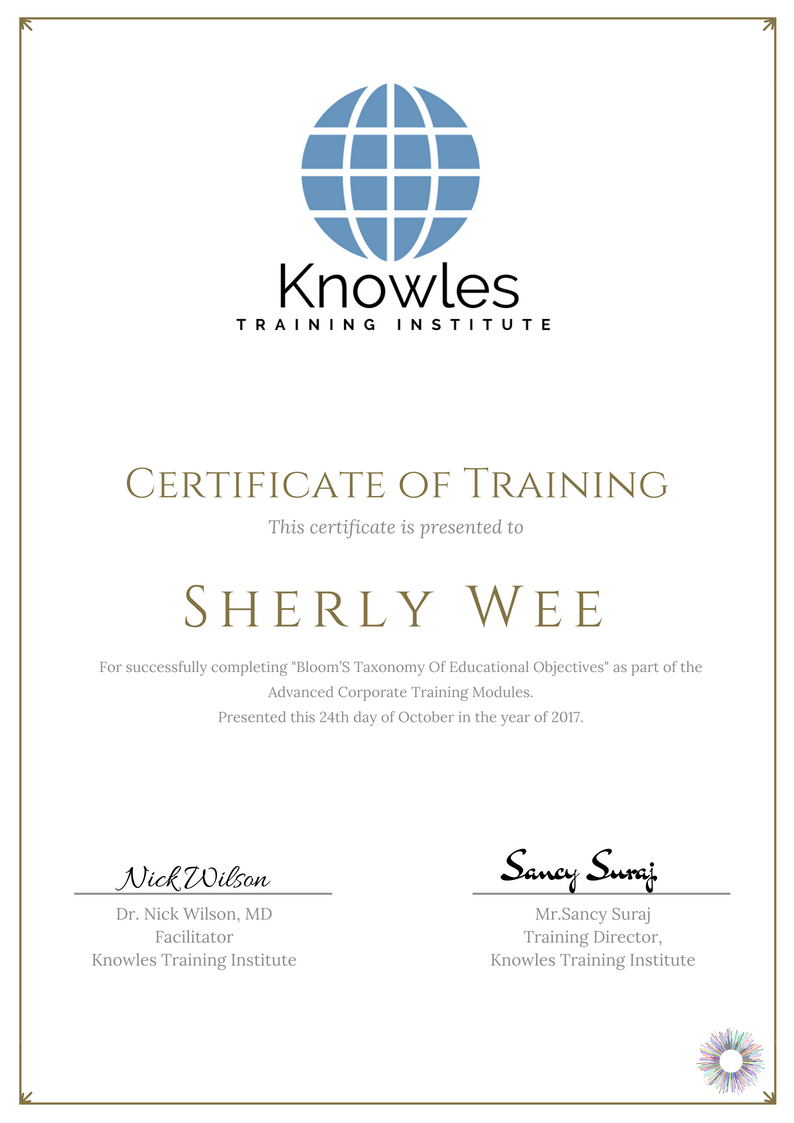
Course Fees
There are 3 pricing options available for this Bloom’S Taxonomy Of Educational Objectives training course. Course participants not in Singapore may choose to sign up for our online Bloom’S Taxonomy Of Educational Objectives training course.
SGD 1,334.96 For a 60-minute Lunch Talk Session.
SGD 584.96 For Half Day Course Per Participant.
SGD 884.96 For 1 Day Course Per Participant.
SGD 1,184.96 For 2 Day Course Per Participant.
Discounts available for more than 2 participants.
Course Discounts, Fundings & Subsidies
We have the following discounts, fundings & subsidies for this Bloom’S Taxonomy Of Educational Objectives training course

Upcoming Bloom’s Taxonomy Of Educational Objectives Training Course Schedule
Contact us for the latest Bloom’S Taxonomy Of Educational Objectives course schedules:
Phone: +65 6714 6663
Email: contact@knowlesti.com
Message:
Download Bloom’s Taxonomy Of Educational Objectives Course Brochure
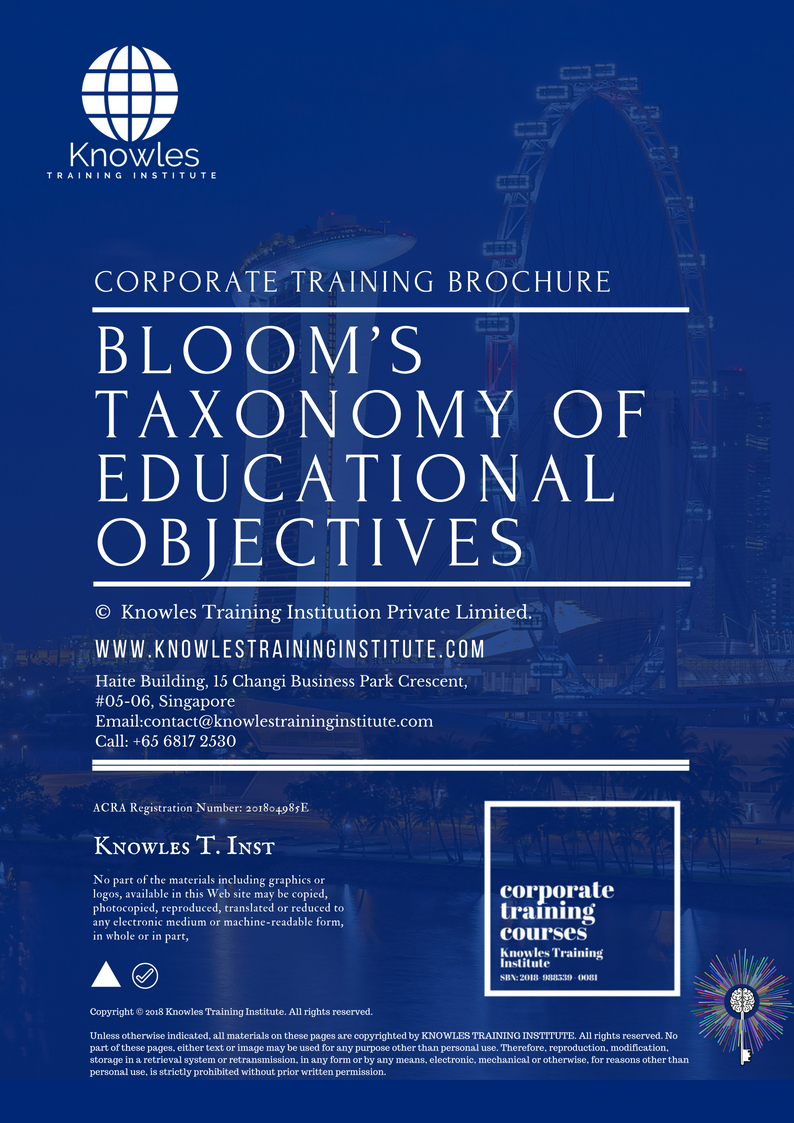
Request for this Bloom’S Taxonomy Of Educational Objectives course brochure. Fill up the short information below and we will send it to you right away!
Post-Training Support: A vast majority of training does not have any effect beyond 120 days. But to work, training has to have a strong pre- and post-training component. Post-training reinforcement consequently helps individuals to recall the understanding and ask questions.
Blended Learning: Learning does not occur in the classroom. Virtually everybody prefers distinct ways of learning. Successful learning should have a multi-channel, multi-modal strategy.
We Understand The Industry: Similarly, we’ve got a profound comprehension of the business, business design, challenges, strategy and the that our participants are in and have designed the courseware to cater to their professional needs.
Course Content: Knowles Training Institute’s material is relevant, of high quality and provide specific learning outputs. As a result, Participants will leave the training course feeling as they have gained a strong understanding and will also be in a position to execute what they have learned sensibly.
Course Development — The workshop modules follow a systematic and logical arrangement. Therefore, this structure helps to ensure that the course material allows the facilitators to deliver the course in a logical arrangement. Consider the subjects as building bricks into learning, our facilitators slowly build towards a comprehensive picture of this entire topic.


Course Enquiries

Fill up the form and we will get back to you in less than 1 working day.
Alternatively, give us a call to have one of our training consultants contact you. Our corporate training courses can be contextualized to meet your organization’s training needs. Leverage on our large pool of professional trainers and consultants for your organization’s training needs.
Office Address: 60 Paya Lebar Rd, #07-54 Paya Lebar Square, Singapore 409051
Office Phone: +65 6714 6663
Email: contact@knowlesti.sg
We Guarantee 100% Privacy. We Respect Your Privacy. Your Information Will Never Be Shared.


